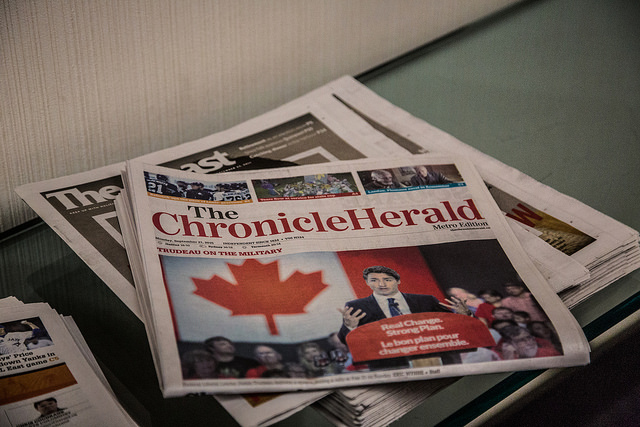Like this article? rabble is reader-supported journalism. Chip in to keep stories like these coming.
“Downhill fast.” The caption over Wednesday’s Chronicle Herald front-page photo — of skateboarders zipping down Citadel Hill — said it all. So too did the management-mandated absence of a photo credit (by Tim Krochak).
The Herald, which bills itself as Canada’s largest independent newspaper, is hurtling ever-faster downhill toward its own oblivion.
And that’s bad news for all of us.
The latest flashpoint is a new collective agreement with the paper’s 61 newsroom employees. Management wants to slash one-third of the editorial staff — after cutting 20 positions last year, and two dozen more in 2009. Those who survive will be paid less to work longer hours. The union calls that a “total rewrite of the contract that would set us back 20 years.”
Last week, union and management traded insults and byline strikes/blockouts. This weekend, management will likely lock out its unionized journalists and replace them with no-byline freelancers working from home on four-month contracts to try to break the union’s will — and possibly the union.
But the ultimate result may be to break the newspaper.
These are extremely tough times for so-called legacy media. Buckling under the burden of last-century printing-and-distribution infrastructure in a digital world overflowing with inkless news and instant circulation, still reluctantly weaning from pre-Internet cash cows like classifieds, real estate and auto sales, and smacking up against newly un-loyal readers no longer willing to pay for what they read, the future must seem, to most publishers, like an impenetrable maze of dark tunnels with no light visible.
That is the reality the Herald’s publishers must confront. They are not alone among traditional newspapers in failing — so far — to find the formula for publishing success.
But the ironic flipside is that more people are reading more news than ever. They’re just getting it in different ways from different sources. And mostly for free.
Someone will someday — soon — figure out how to monetize that.
The news/news media has a future.
My fear is that Herald management — by cutting back on quality journalism that is its only significant “value proposition” while transforming those who create that value into under-valued enemies — will only make the situation worse.
And the newspaper may not be around to reap that future.
This article first appeared in Stephen Kimber’s Halifax Metro column.
Photo: Tony Webster/flickr
Like this article? rabble is reader-supported journalism. Chip in to keep stories like these coming.




